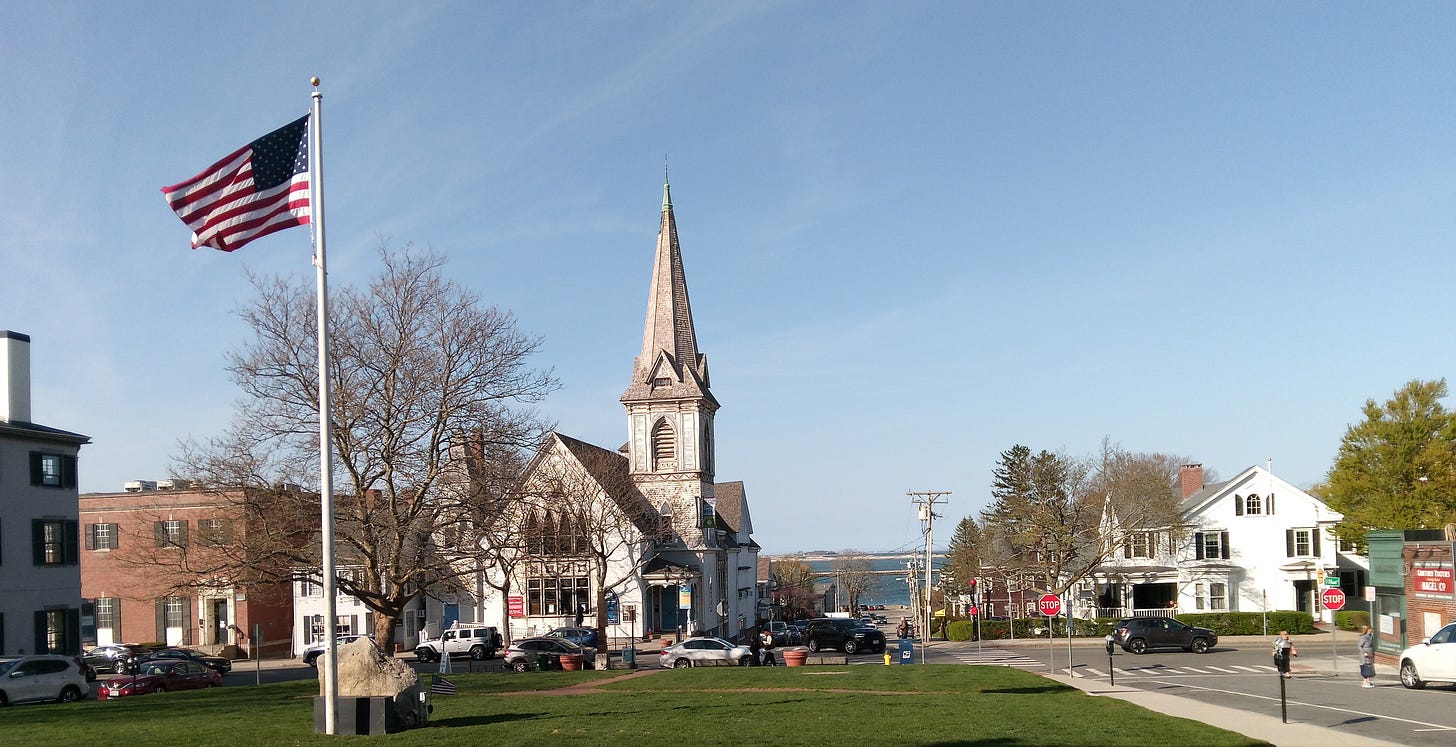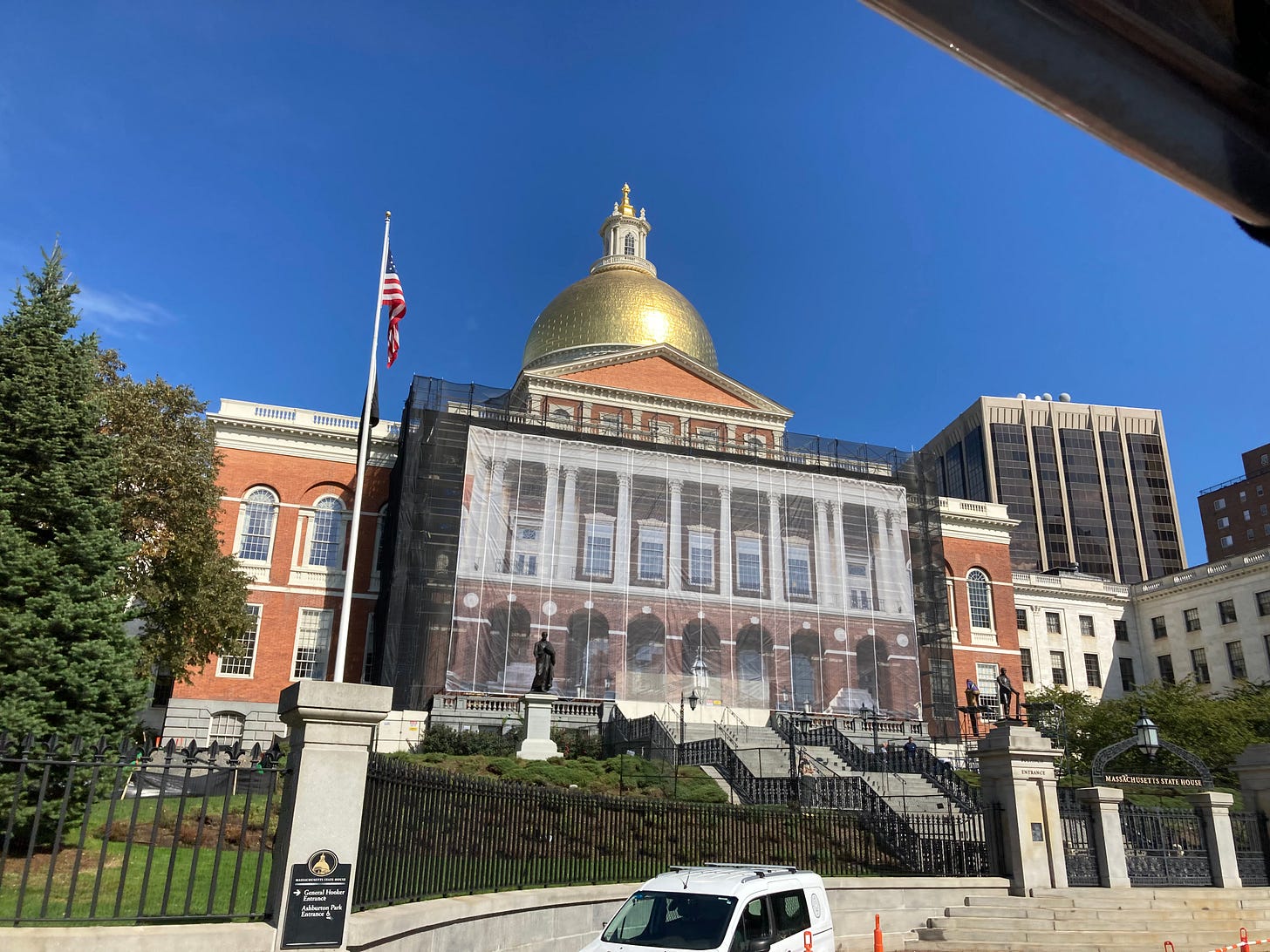Climate Chief Hoffer To Visit Plymouth; Solar Legislation; Great Ponds
[ Readers, below is another multi-part, 3-in-1 article — the first two sections are free to all, while the last is for paid subscribers only. Paid subscribers are critical in terms of allowing this publication to continue; if you wish to become a paid subscriber, you may do so using the “Subscribe” buttons in the text. If you are already one, my deepest thanks, and indeed, my thanks to all who read or otherwise support this publication (I recognize paid subscriptions are not feasible for everyone, and I do appreciate those who provide support in other ways — in fact, I am honored to be read at all). Finally, should you wish for whatever reason to leave a tip, you may do so here: paypal.me/plymouthcountyobserv; thanks as always — Ben.]
Mass. Climate Chief Melissa Hoffer To Hold “Conservation Conversation” at Spire Center in Plymouth
(PLYMOUTH) – The Southeast Massachusetts Pine Barrens Alliance (SEMPBA) will host a discussion between the first-ever Massachusetts Climate Chief, Melissa Hoffer, David Boutt, PhD., Professor in the Department of Earth, Geographic, and Climate Sciences at the University of Massachusetts-Amherst, and David Abel, Climate Reporter for The Boston Globe, on Saturday, June 24th, 2023, at the Spire Center in Plymouth.
(The Spire Center in Plymouth; credit — J. Benjamin Cronin.)
The event, entitled “H2 w0w! Connecting Climate, Water and Community,” kicks off at 9:30 a.m., with coffee and light refreshments, followed by the discussion at 10 a.m. Later in the day, at 2 p.m., a series of guided hiking tours will explore the lands and waters of Plymouth.
“We’re excited about the opportunity to hear what Ms. Hoffer says, what her plans are for Massachusetts, but also to have a chance to speak with her, to acquaint her with that other Plymouth, with our forests, our 450 ponds, our amazing array of natural resources and our special environmental needs,” said Frank Mand, Vice President of The Southeastern Massachusetts Pine Barrens Alliance.
On her first day in office in January, Gov. Maura Healey (D) signed an executive order establishing an Office of Climate Innovation and Resilience within the Governor’s Office. Prior to her appointment to Gov. Healey’s cabinet, Ms. Hoffer served as Acting General Counsel and Principal Deputy General Counsel of the Environmental Protection Agency (EPA) in the Biden Administration.
She had previously served in the Massachusetts Attorney General’s Office, as well as working in a leadership role at the Conservation Law Foundation, and as an environmentally focused attorney at the Boston law firm of WilmerHale.
Prof. Boutt — whose research interests, according to his website, include “the role of groundwater in catchment scale hydrologic processes, regional-scale groundwater flow and transport, groundwater-surface water interactions, isotope hydrology, coupled processes in hydrogeology, fractured rock hydrogeology, [and] paleohydrology”1 — will present the results of a two-year study of Plymouth's hydrogeology and the town's vulnerability to saltwater intrusion.
Mr. Abel covers climate and environmental matters at The Boston Globe. His experience as a reporter is wide, having covered not only climate, but conflict in the Balkans, terrorism in American cities like Boston and New York., and upheaval in Latin America. He was part of the Globe team that in 2014 received the Pulitzer Prize in Breaking News for its coverage of the Boston Marathon Bombing in 2013.
After the morning’s discussion, a series of hikes will commence in the afternoon, starting at 2 p.m.
One hike, starting from the parking lot of Ellisville Harbor State Park at 1861 State Road in Plymouth, will be led by Herring Pond Wampanoag Chairwoman Melissa Harding Ferretti and Outreach Coordinator Jill Lauzon. The walk will examine local hydrogeology from a Wampanoag perspective.
“During this walk, Tribal Chairwoman Ferretti and Outreach Coordinator Jill Lauzon will discuss the importance of the teachings of Elders and other community members about Indigenous place-based knowledge: a knowledge which reflects the spirit and power of Indigenous peoples and which is rooted in an enduring connection to land, water, and wildlife,” notes the event description.
“Indigenous place-based knowledge offers us the guidance required to heal the earth and to end environmental exploitation and destruction,” it continued.
A second hike will examine urban adaptation and resiliency. Led by Town of Plymouth Marine and Environmental Affairs Director David Gould and Sustainable Plymouth’s Dale Bryan, the walk will depart from 216 Water Street, opposite the Copper Cove Condominiums.
The walk will examine a number of local adaptation projects, including a revetment covering zinc pollution from the former Revere Copper and Brass factory, an abutment wall surrounding a wastewater pump, the relocation of the Mabbett Park sewer line, and a possible redesign of the Main Street Extension parking lot in the Historic District, taking into account stormwater runoff and urban heat island effects.
If there is interest, North Plymouth sites, including in the vicinity of Cordage Park, may be included.
A third hike, led by Malcolm MacGregor, will explore the Eel River Watershed. The hike will begin at the parking lot at 4 Boot Pond Road at 2 , and will proceed “around the ground-breaking Eel River bog restoration, then cross Long Pond Road to a loop in conservation land adjacent to Russel Mills Pond. The trail includes multiple sections of wooden bog bridges along wetter portions of the trail (you may get wet) , and a resting bench adjacent to the headwaters installed by the Trails Committee, before finishing at Hoyt's Pond,” according to promotional materials.
“[The] hike could include a little ' bushwacking' and route variations,” it noted.
The fourth hike, led by Frank Mand and Denise Stowell of the Southeastern Massachusetts Pine Barrens Alliance, will explore one of the region’s globally rare coastal plain ponds, Three-Cornered Pond in Myles Standish State Forest. Characterized by the presence of endemic species such as the Plymouth Gentian and Plymouth red-bellied turtle, these glacial lakes constitute one of the defining features of the southeastern Massachusetts pine barrens eco-region.
The event is free to the public, though organizers do ask that those interested in attending sign up to do so here, via Eventbrite.
Solar Bills Go To Committee on Beacon Hill; Concerns Around Clear-cutting, Municipal Authority
(BOSTON) – Two bills that would increase the power of municipalities to reasonably regulate solar energy siting in light of concerns around clear-cutting existing forests have been heard in Committee on Beacon Hill.
H. 3230, brought by Rep. Aaron L. Saunders (D-Belchertown) and S. 2164, brought by Sen. Jacob D. Oliveira (D-Ludlow) — both entitled An Act Allowing Municipalities To Reasonably Regulate Solar Siting — are being considered this week before the Telecommunications, Utilities and Energy (TUE) Committees of the House and Senate, respectively.
(The Massachusetts State House; credit — Wesley Fryer; CC by 2.0.)
Because of an ongoing procedural dispute between the Massachusetts House and the Senate, the TUE Committee is not meeting as a joint committee, but rather as two separate committees of the upper and lowers houses of the legislature.
The text of each bill reads:
“Section 3 of chapter 40A of the General Laws, as appearing in the 2020 Official Edition, is hereby amended by striking out the ninth paragraph, in lines 123 to 126, inclusive, and inserting in place thereof the following paragraph:
No zoning ordinance or by-law shall prohibit or unreasonably regulate the installation of solar energy systems or the building of structures that facilitate the collection of solar energy for residential purposes except where necessary to protect the public health, safety or welfare. Commercial, governmental, and non-residential solar energy structures and systems may be reasonably regulated for purposes of (i) protecting public health, safety and welfare; (ii) preserving forested lands, agricultural lands, or wetlands; or (iii) ensuring compatibility with municipal zoning.”
Lenore Bryck, of Amherst, testified in support of the bills before the House Committee on June 20th.
“I’m testifying in support of four bills that encourage solar development where it makes the most sense, like disturbed lands, [rather than damaging] or sacrifice our essential ecosystems like forests — which are our climate superheroes — wetlands, and farmlands,” said Ms. Bryck. “Newly emerging man-made energy technologies are necessary, but not to replace nature’s ancient technologies….”
“Towns are being bullied for trying to protect their lands and natural resources as we’ve been witnessing devastating damage state-wide by big solar companies, subsidized by taxpayers, but ill equipped to understand the impact of industrial solar installations on greenlands — and no oversight by the State,” said Ms. Bryck.
The bills come in the wake of a number of solar power projects across the Commonwealth that have been built after their developers have clear-cut, and often mine the mineral products of forested or otherwise vegetated lots, thereby undermining the putative purpose of solar energy — the reduction of the amount of carbon dioxide and other greenhouse gasses in the atmosphere — by destroying forests, which are critical carbon sinks.
It is, in climate terms, robbing Peter to pay Paul.
The issue has been the subject of public controversy across the Commonwealth. Shutesbury, a small town in Franklin County about ten miles northeast of Amherst, is the subject of a lawsuit regarding its solar bylaw, brought by large local landowner W.D. Cowls and multinational solar energy company AMP, according to a column by Jill Buchanan in The Greenfield Recorder.2
Meanwhile, in Eastern Massachusetts, Maya Benjamin of The Cambridge Day reports that the City of Cambridge is suing the Lexington Planning Board and a Marlboro limited liability corporation to stop a proposed 5.5 acre solar installation that will destroy approximately 1,000 mature trees proximate to the Hobbs Brook Reservoir, a source of drinking water for the City of Cambridge.3
(Solar energy installation in Carver, following clear-cutting and sand-mining; credit — Carver Concerned Citizens.)
Trees, as Ms. Bryck noted, are a powerful weapon in mitigating our climate crisis; since trees use atmospheric carbon dioxide as part of the chemical process of photosynthesis, they serve as a critical source of carbon sequestration. According to the U.S. Forest Service, forests across the globe removed approximately ⅓ of fossil fuel emissions in the period 1990-2007.4
“Trees are without a doubt the best carbon capture technology in the world. When they perform photosynthesis, they pull carbon dioxide out of the air, bind it up in sugar, and release oxygen,” noted Pennsylvania State University’s Calvin Harris, Assistant Teaching Professor of Forestry, and Melissa Kreye, Assistant Professor of Forest Resource Management, in a September, 2020, article.
“Trees use sugar to build wood, branches, and roots. Wood is an incredible carbon sink because it is mostly made of carbon (about 50%), it lasts for years as a standing tree, and takes years to break down after the tree dies. While trees mainly store carbon, they do release some carbon, such as when their leaves decompose, or their roots burn sugar to capture nutrients and water,” they continued.
Professors Harris and Kreye pointed to the example of a white oak, which can live for two centuries, and is removing carbon from the atmosphere throughout that time. After the tree’s death, its slow decomposition helps continue to sequester carbon.
An increasing number of voices likewise argue that trees ought to be treated as a public good, from activists to scientists to everyday citizens.
”Without carbon dioxide uptake by trees, its concentration in the atmosphere would be rising nearly twice as fast as we observe today. The atmosphere over urban areas often shows a ‘halo’ of high carbon dioxide, reflecting the abundant use of fossil fuels in cities and limited uptake by vegetation,” said Dr. William H. Schlesinger, a biogeochemist and the President Emeritus of the Cary Institute of Ecosystem Studies, an independent, not-for-profit environmental research organization.
“Far from being a lunatic fringe, those who plant trees are making the world a more pleasant place for humans. When trees are planted in cities, their transfer of water from soils to the atmosphere—a process known as transpiration—results in significant cooling of the atmosphere,” said Dr. Schlesinger.






